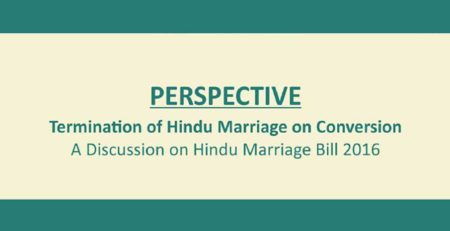The Law of Tawhin-i-Risalat: A Social, Political and Historical Perspective
Misgivings about the law
Before we discuss the misgivings expressed about this law by some sections of our society, let us recall that according to the Constitution of the Islamic Republic of Pakistan, the state is committed to uphold the principles of democracy, freedom, equality, tolerance and social justice, not as these terms are understood in the West or in any other theoretical framework but as enunciated in Islam (Article 2‑A). This qualifying statement embodied in the “Objectives resolution” was adopted by our founding fathers because they did not want these terms to be interpreted after the European secular tradition or any other culture but as understood in the context of Islam and its history.
At the same time, we have no doubt that the Constitution of Pakistan guarantees full rights to the non‑Muslim minorities subject to the law, public policy and morality. Our Constitution places certain limitations on the rights and privileges of the citizens. The law has its own requirements. As to public policy and morality, this has to be understood and interpreted in the light of the feelings and aspirations of the majority of people.
A small section of our society feels also uncomfortable about this law since they think it is inconsistent with the fundamental human rights guaranteed under the Constitution. This is hardly sustainable because of the limitations imposed by the Constitution itself. Even politically, it is not advisable for the minorities in this country to raise eyebrows on this law. They know fully well, or they should know, that the Muslims of Pakistan cannot acknowledge any right for anybody, including minorities to claim, under any pretext, the liberty to blaspheme against Islam or to insult their Prophet. The Muslims of Pakistan are really at a loss to understand the logic of allowing freedom to insult the most sacred and the most beloved person in the human history.
Pakistan’s liberal intellectuals have failed to understand the inherent illiberality of their own doctrines of freedom. The havoc created in the name of liberal ideas and scientific approach is far more devastating to human freedom and decency than those made in the name of religion. The atrocities committed by the upholders of liberal ideas in eighteenth and nineteenth century Muslim India are known facts. Similarly, the record of leftist liberals in Central Asia in early twentieth century and in Bosnia today needs no illustration. The liberals of Indian National Congress (Nehru family included) possess a similar record. What is happening to Iraq, Iran, Libya and Algeria at the hands of the liberal West needs no comments, either. It is strange that the Muslims are told to compromise their primary values and the very foundations of their identity to accommodate the whims of those who have never been liberal to us.
Some people object to the law on the plea that it is inconsistent with secular ideas. They forget that Pakistan was never a secular country; it did not come into existence because of secularism. Rather, it came into existence only when the Muslims as a nation, with Islam as their sole identity rejected the secular concept of united Indian nationalism, advocated by Indian National Congress. Pakistan, therefore, should not be expected to behave and adopt policies like other secular states, leaving aside the question of how far other secular states are behaving in matters where Muslims may happen to be at the receiving end.
Some people confuse the question of repudiating Muhammad’s prophethood with the insult of his person. These two are altogether different things. While a non‑Muslim is free to disclaim him as God’s prophet or to negate his prophethood, no one is allowed to insult him or use derogatory remarks against him.
Some highly placed people have come out with a rather queer argument against this law. They say that in view of the drop in the law enforcement and problems with judiciary it would make little sense to punish a person on the charge of insulting the Prophet. If this argument is accepted, then all laws should be scrapped, not only in Pakistan but in every country because the law‑and‑order situation has never been perfect in the modern world.
Unfortunately, our decision makers share some of these misgivings. Repeatedly they come out with statements betraying their reservations about this law.
Lately, the government has constituted a committee consisting of four Muslims and four minority members. None of the Muslim members is from the legal profession or the ‘ulamā. The committee has called for adopting a different procedure in the cases involving offenses under Section 295‑C. The proposed procedure calls for empowering the police to institute inquiry on the merit of the allegation and then register or reject the first information report (FIR). This proposal is fraught with grave implications. On the one hand, the delay in registering the FIR and start of the proceeding will create a law and order situation, which may possibly result in the murder of the accused as well as other suspects. This amounts to a denial of the right of legal defense to the accused. Moreover, a delay in the registration of the FIR will also create doubts and raise suspicions about the legality of the case. Further, in view of the strong reservations about the performance of the police, any extension of their role to decide about the legality of a complaint and then dispose it off will amount to virtual repeal of the law itself, an assault on the preserve of the judiciary.
Some people have proposed that special provisions should be made in the law whereby the complainant should be punished for false accusation if the case is not proved in a court of law. This seems contrary to all norms of law and justice. In a country where the judicial system seems to be in a process of rapid collapse, where plaintiffs and complainants have no protection of the law, where witnesses are threatened within the courtrooms, where the litigants are killed and opponents assassinated within the court premises, such an amendment will close all doors for punishing the offenders under this law. Who will have the courage to come forward and lodge a complaint knowing well that if dismissed, he would invite his own prosecution? More so, when the sympathies of not only lawmakers and senior government officials but also of law‑enforcing agencies are inclined toward the defilers rather than the millions of Muslims whose beloved Prophet would be insulted without any viable remedy open to them.
Besides, the proposed amendment of punishing the complainant seems to be unwarranted because already there are provisions in the Pakistan Penal Code as well as in the Criminal Procedure Code to punish a person giving false information with the intent to give injury to another person. Chapters 10 and 11 of the Pakistan Penal Code deal with a variety of such cases including false evidence and offenses against public justice. Instead of making discriminatory provisions in favor of the offender insulting the Prophet (‘alayhi as-salām) the provisions of Chapter 11 of the Pakistan Penal Code should be simplified and made more effective.






